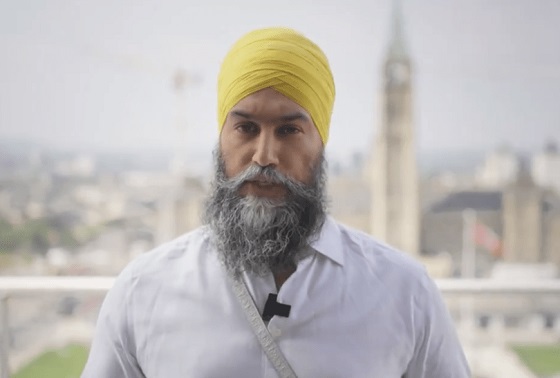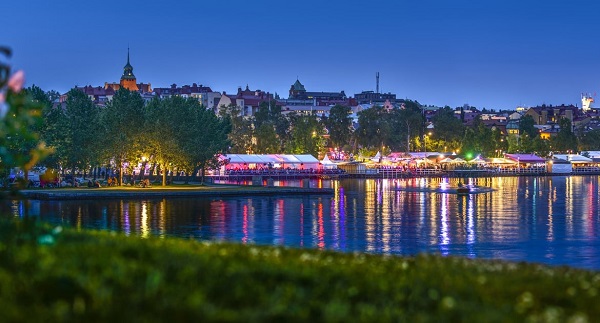National
NDP leader Jagmeet Singh pulls support from Trudeau’s Liberals

From LifeSiteNews
“The Liberals are too weak, too selfish and too beholden to corporate interests to stop the Conservatives and their plans to cut. But the NDP can.”
New Democratic Party leader Jagmeet Singh announced today that his deal to keep Trudeau and his Liberal Party in power is ‘done,’ leading to speculation as to whether an election may be called before it is mandated in October 2025.
The head of the New Democratic Party (NDP), Jagmeet Singh, today announced he is pulling his official support for Prime Minister Justin Trudeau’s Liberals, meaning there is now a possibility a fall election could be held should a non-confidence vote pass in the House of Commons.
“The deal is done. The Liberals are too weak, too selfish and too beholden to corporate interests to stop the Conservatives and their plans to cut. But the NDP can,” wrote Singh on X this afternoon.
The deal is done.
The Liberals are too weak, too selfish and too beholden to corporate interests to stop the Conservatives and their plans to cut. But the NDP can.
Big corporations and CEOs have had their governments. It's the people's time. pic.twitter.com/BsE9zT0CwF
— Jagmeet Singh (@theJagmeetSingh) September 4, 2024
“Big corporations and CEOs have had their governments. It’s the people’s time.”
Singh also posted a video to go along with his X statement, saying, “Justin Trudeau has proven again and again he will always cave to corporate greed. The Liberals have let people down. They don’t deserve another chance from Canadians.”
He then took a shot at Canada’s Conservative Party leader Pierre Poilievre, calling him an even bigger “threat” than Trudeau.
Before today, Singh had in place an informal coalition with the Trudeau government that began last year. This agreement has until now kept the Liberals in power until the next election, which is scheduled for the fall of 2025.
It is expected that later today Singh will lay out in detail what his pulling out of the deal with Trudeau will fully entail. Some pundits have speculated that he may still support the Liberals on most bills, which would keep the Liberals in power.
Late last month, leader of Canada’s Conservative Party Pierre Poilievre called on Singh to pull his support for Trudeau’s Liberals, so that an election could be held.
Recent polls show that the Conservatives under Poilievre would win a majority government in a landslide were an election held today. Singh’s NDP and Trudeau’s Liberals would lose a massive number of seats.
As reported by LifeSiteNews, the Trudeau Liberals were hoping to delay the 2025 federal election by a few extra days in what many see as a stunt to try and secure pensions for MPs who are projected to lose their seats. Approximately 80 MPs would qualify for their pensions should they sit as MPs until at least October 27, 2025, which is the newly proposed election date. The election date as it stands now is set to happen on October 20, 2025.
LifeSiteNews, in a recent opinion piece by this writer, observed that most of the recent polling shows that if a federal election were held today, “Pierre Poilievre’s Conservative Party would not only mop the floor of the House of Commons of most Liberal MPs but wash the windows of the house on Parliament Hill as well with a tint of conservative blue.”
2025 Federal Election
Next federal government should recognize Alberta’s important role in the federation

From the Fraser Institute
By Tegan Hill
With the tariff war continuing and the federal election underway, Canadians should understand what the last federal government seemingly did not—a strong Alberta makes for a stronger Canada.
And yet, current federal policies disproportionately and negatively impact the province. The list includes Bill C-69 (which imposes complex, uncertain and onerous review requirements on major energy projects), Bill C-48 (which bans large oil tankers off British Columbia’s northern coast and limits access to Asian markets), an arbitrary cap on oil and gas emissions, numerous other “net-zero” targets, and so on.
Meanwhile, Albertans contribute significantly more to federal revenues and national programs than they receive back in spending on transfers and programs including the Canada Pension Plan (CPP) because Alberta has relatively high rates of employment, higher average incomes and a younger population.
For instance, since 1976 Alberta’s employment rate (the number of employed people as a share of the population 15 years of age and over) has averaged 67.4 per cent compared to 59.7 per cent in the rest of Canada, and annual market income (including employment and investment income) has exceeded that in the other provinces by $10,918 (on average).
As a result, Alberta’s total net contribution to federal finances (total federal taxes and payments paid by Albertans minus federal money spent or transferred to Albertans) was $244.6 billion from 2007 to 2022—more than five times as much as the net contribution from British Columbians or Ontarians. That’s a massive outsized contribution given Alberta’s population, which is smaller than B.C. and much smaller than Ontario.
Albertans’ net contribution to the CPP is particularly significant. From 1981 to 2022, Alberta workers contributed 14.4 per cent (on average) of total CPP payments paid to retirees in Canada while retirees in the province received only 10.0 per cent of the payments. Albertans made a cumulative net contribution to the CPP (the difference between total CPP contributions made by Albertans and CPP benefits paid to retirees in Alberta) of $53.6 billion over the period—approximately six times greater than the net contribution of B.C., the only other net contributing province to the CPP. Indeed, only two of the nine provinces that participate in the CPP contribute more in payroll taxes to the program than their residents receive back in benefits.
So what would happen if Alberta withdrew from the CPP?
For starters, the basic CPP contribution rate of 9.9 per cent (typically deducted from our paycheques) for Canadians outside Alberta (excluding Quebec) would have to increase for the program to remain sustainable. For a new standalone plan in Alberta, the rate would likely be lower, with estimates ranging from 5.85 per cent to 8.2 per cent. In other words, based on these estimates, if Alberta withdrew from the CPP, Alberta workers could receive the same retirement benefits but at a lower cost (i.e. lower payroll tax) than other Canadians while the payroll tax would have to increase for the rest of the country while the benefits remained the same.
Finally, despite any claims to the contrary, according to Statistics Canada, Alberta’s demographic advantage, which fuels its outsized contribution to the CPP, will only widen in the years ahead. Alberta will likely maintain relatively high employment rates and continue to welcome workers from across Canada and around the world. And considering Alberta recorded the highest average inflation-adjusted economic growth in Canada since 1981, with Albertans’ inflation-adjusted market income exceeding the average of the other provinces every year since 1971, Albertans will likely continue to pay an outsized portion for the CPP. Of course, the idea for Alberta to withdraw from the CPP and create its own provincial plan isn’t new. In 2001, several notable public figures, including Stephen Harper, wrote the famous Alberta “firewall” letter suggesting the province should take control of its future after being marginalized by the federal government.
The next federal government—whoever that may be—should understand Alberta’s crucial role in the federation. For a stronger Canada, especially during uncertain times, Ottawa should support a strong Alberta including its energy industry.
2025 Federal Election
Donald Trump suggests Mark Carney will win Canadian election, touts ‘productive call’ with leader

From LifeSiteNews
‘It was an extremely productive call, we agree on many things, and will be meeting immediately after Canada’s upcoming Election,’ Trump wrote about Carney on Friday.
U.S. President Donald Trump says he had “an extremely productive call” with Prime Minister Mark Carney and implied that the World Economic Forum-linked politician will win Canada’s upcoming federal election.
“I just finished speaking with Prime Minister Mark Carney, of Canada,” Trump wrote on Truth Social Friday. “It was an extremely productive call, we agree on many things, and will be meeting immediately after Canada’s upcoming Election to work on elements of Politics, Business, and all other factors, that will end up being great for both the United States of America and Canada. Thank you for your attention to this matter!”
Reacting to the post, LifeSiteNews editor-in-chief John-Henry Westen wrote on X:

Trump’s comments come just weeks before Canadians head to the polls on April 28 for a federal election. Carney called the snap-election just nine days after taking over for Justin Trudeau as leader of the Liberal Party and prime minister.
Carney, an admitted “globalist” and “elitist,” formerly served as head of the Bank of Canada and Bank of England, and has extensive ties to globalist groups like the World Economic Forum and the United Nations.
Trump’s comments regarding Carney may prove significant as much of the debate in the mainstream media ahead of the election has been about how the prospective leaders will handle tariff threats and trade deals with America.
-

 Alberta2 days ago
Alberta2 days agoAlberta Institute urging Premier Smith to follow Saskatchewan and drop Industrial Carbon Tax
-

 Addictions2 days ago
Addictions2 days agoShould fentanyl dealers face manslaughter charges for fatal overdoses?
-

 Alberta2 days ago
Alberta2 days agoAlbertans have contributed $53.6 billion to the retirement of Canadians in other provinces
-

 Also Interesting1 day ago
Also Interesting1 day agoThe bizarre story of Taro Tsujimoto
-

 2025 Federal Election2 days ago
2025 Federal Election2 days agoChinese Gangs Dominate Canada: Why Will Voters Give Liberals Another Term?
-

 Energy2 days ago
Energy2 days agoEnergy, climate, and economics — A smarter path for Canada
-

 Health24 hours ago
Health24 hours agoRFK Jr. Drops Stunning Vaccine Announcement
-

 2025 Federal Election22 hours ago
2025 Federal Election22 hours agoSoaked, Angry, and Awake: What We Saw at Pierre Poilievre’s Surrey Rally





